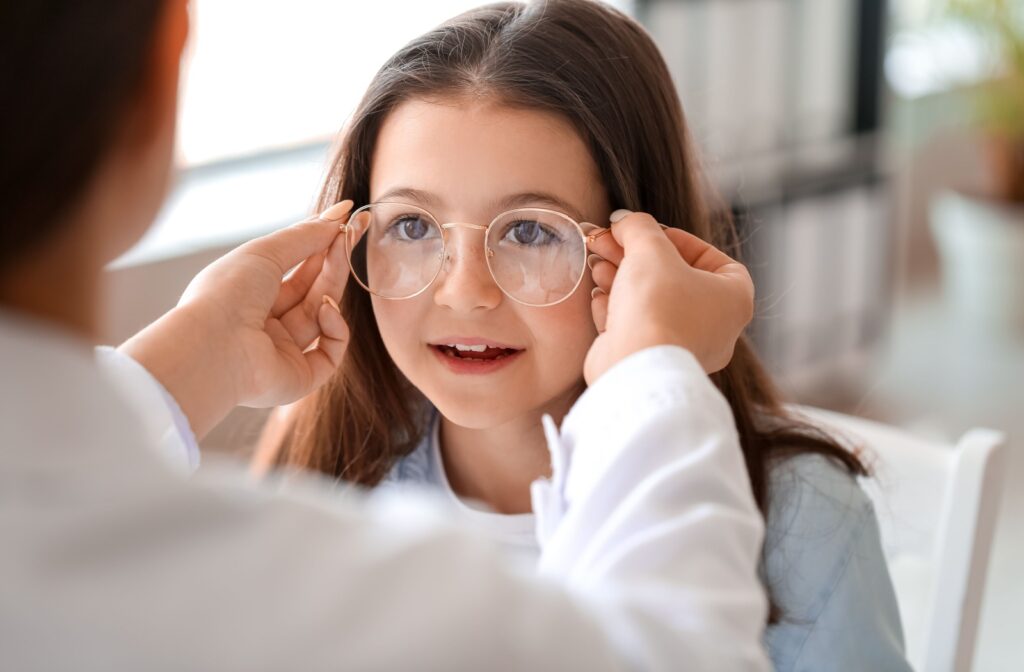You suspect that you or your child has myopia or nearsightedness. Now what? Who do you turn to for help? If you’re a concerned parent or someone that has blurry vision, your local eye doctor can treat myopia with corrective glasses or contact lenses.
Find a local eye doctor near you HERE.
Myopia is diagnosed by checking a patient’s medical history and with a comprehensive eye exam. Once the severity of the myopia is determined, your eye doctor can recommend the appropriate treatment based on individual vision needs.
What Is Myopia?
Myopia is a common eye condition or refractive error that results in blurry distant vision while close-up images appear clear. It’s caused by a too-long eyeball or too steeply curved cornea (the clear front layer of the eye).
An irregular eye shape causes light to focus in front of the retina (the light-sensitive tissue at the back of the eye) instead of directly on it to form a clear image, leading to far-away objects looking blurry.
Other symptoms of myopia include:
- Squinting
- Eye strain
- Tired or sore eyes
- Headaches
Myopia usually starts in early childhood and can progress as the eye grows. Without treatment, myopia can progress or worsen to severe or high myopia. Severe myopia can increase a child’s risk of severe eye conditions or diseases later in life, such as:
While myopia can affect anyone, certain risk factors may increase the likelihood of developing this condition, including the following:
- Genetics: If one or both parents have myopia.
- Environmental factors: Excessive screen time and lack of outdoor activities.
Who Treats Myopia?
Myopia can be managed and treated by several eye care professionals whether you’re looking for a routine eye exam or need specialized care for more severe myopia cases.
Optometrists
When considering eye exams and vision care, you’re likely thinking of optometrists. These professionals are at the front line of myopia treatment. Here’s what they do:
- Diagnose myopia with a comprehensive eye exam, including tests such as visual acuity and refraction.
- Prescribe eyeglasses or contact lenses to help you see clearly.
- Offer advanced treatments like orthokeratology or myopia control lenses for kids.
- Provide lifestyle tips, such as reducing screen time or taking frequent outdoor breaks to slow myopia progression.
Optometrists aren’t just for adults. They’re also for children. If you’re a parent worried about your child’s vision, an optometrist is your go-to person.
Ophthalmologists
An ophthalmologist is a medical doctor who specializes in eye health. If your myopia is severe or has complications like retinal issues, they’ll step in. They can:
- Provide medical treatments for eye-related health concerns associated with myopia.
- Correct vision in adults with laser eye surgery.
Most people won’t need to visit an ophthalmologist for routine myopia management, unless referred by their optometrist.
Opticians
While opticians don’t diagnose or treat myopia, they play an important role in your vision care. Think of them as the stylists of your vision—they make sure your glasses look and feel great. They can:
- Help fit, adjust, and select eyeglasses frames after you’ve received a prescription from your optometrist.
- Provide recommendations for specialized lenses, including those designed to slow myopia progression.

What Are My Treatment & Management Options for Myopia?
Once you see your optometrist, they can recommend the right management and treatment options. They’ll guide you through treatments like:
- Eyeglasses: The simplest and most common solution to correct blurry vision.
- Contact lenses: Perfect for those who want a glasses-free look or those who play sports.
Myopia control methods to prevent progression include:
- Ortho-K lenses: These are worn overnight and temporarily reshape the cornea, so you don’t need corrective lenses during the day. However, if you stop wearing them, the cornea can return to its original shape.
- Atropine eye drops: Low-dose drops can slow myopia progression in kids.
- Special myopia control glasses or contact lenses: These are specifically designed for children to slow progression.
- LASIK or corrective surgery: Long-term solutions for adults with stable prescription.
If you’re still unsure which option is right for you, your optometrist can advise on the pros and cons of each treatment.
When Should You See an Expert?
Here are some signs when you should see an eye doctor:
- Blurry vision at all distances.
- Kids with squinting, holding books too close, or struggling at school.
- Severe or rapidly worsening myopia symptoms.
You’re Not Alone in the Myopia Journey
Whether you’re exploring glasses for the first time, curious about laser eye surgery, or considering specialty lenses for your child, your eye doctor is ready to help you.
For more information on myopia treatment and management solutions, book an appointment with one of the Total Vision locations that offer myopia control.



